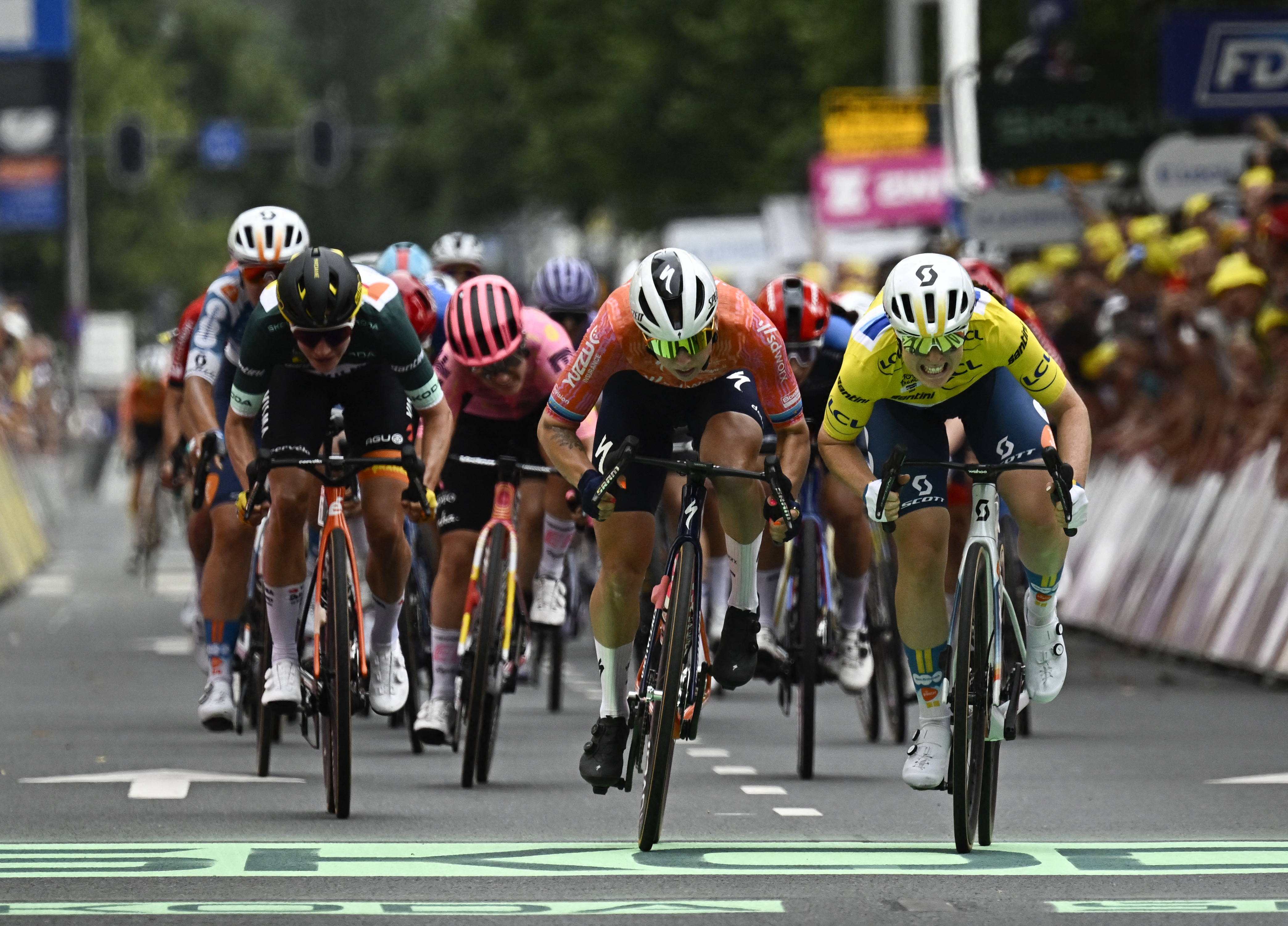'Dangerous' lead-out lands Guarischi first yellow card under new UCI rule
‘She stopped cycling and started cheering in the microphone’ admit SD Worx-Protime

The first UCI yellow card for dangerous riding has been awarded at the Tour de France Femmes, with Barbara Guarischi (SD Worx-Protime) warned for her actions during the stage 2 sprint.
The Italian lead-out specialist’s punishment was revealed in the official post-race communiqué, citing “improper conduct that endangers others in the final sprint” as per Article 2.12.007.8.2-1 of the UCI regulations.
SD Worx-Protime later confirmed Guarischi was given a yellow card for having stopped pedalling and taking her hands off the bars after completing her lead-out for Lorena Wiebes. The UCI commissaires ruled the move as dangerous.
“Barbara pulled the sprint for Lorena Wiebes and then she stopped cycling and started cheering to Lorena in the microphone and they said it was a dangerous situation,” sports manager Danny Stam told Cyclingnews.
“I think it can create some dangerous moments because if someone is standing still in the bunch, and they come from behind with speed, then it’s something.”
Despite ultimately conceding that this is how the new yellow card rule will be applied, Stam suggested that such moves aren’t a rare occurrence in sprints, with lead-out riders tending to drop back through the peloton after completing their effort.
“I mean you see it everywhere eh?” Stam suggested.
The latest race content, interviews, features, reviews and expert buying guides, direct to your inbox!
“Every sprint it’s the same but OK, if this is the point at what is a yellow card.”
Amid the chaos of a double stage race day on Tuesday, SD Worx-Protime were initially confused by the decision, with little initial communication from the UCI judges.
“Nobody knows no. We don’t know, we have absolutely no clue,” sports director Anna van der Breggen said, speaking to Cyclingnews and Velo after stage 3.
“We will ask because if you make a mistake, you need to know the mistake and then you can improve. So we will ask and hopefully get an explanation.”
Van der Breggen even spoke to Guarischi after the stage and she was just as dumbfounded. A closer examination of her actions in the final does show the Italian complete her lead-out, before shouting at Wiebes. She then took one hand off the handlebars to scream more encouragement via her radio.
“We asked Barabara herself ‘Did you do something that you think was on the limit?’ but she doesn’t know. She says and she wants to know as well,” said Van der Breggen.
With Stam and the team learning of the incident, he simply confirmed that “She was annoyed about it.”
This is how the UCI yellow card system works:
Yellow cards in cycling are a new system currently being trialled by the UCI, taking inspiration from football, with a trial period currently being run on their use until December 31 2024.
After this period, their use will be evaluated by SafeR, the safety initiative project partially launched last year by the UCI and key stakeholders in cycling aimed at improving safety in men’s and women’s races, which is expected to be fully functioning from January 1 2025.
For the moment, “yellow cards will represent a sanction but will not physically exist”, and an accumulation of them will not result in further punishment such as disqualification from races or suspension, however, that will be the aim of the system going forward.
The initiative was designed to monitor any bad conduct of the peloton and anyone in the race convoy, with riders, sports directors, journalists and motorbike drivers among those eligible to receive the sanction.
The UCI also mapped out 21 incidents which could lead to a yellow card in article 2.12.007, alongside the already-in-place sanctions of fines, points deductions, ejections etc, with incidents ranging from “taking off mandatory helmet during the race” for riders to “Interviewing a rider during the race” for journalists.
After the SafeR evaluation of the five-month trial period, accumulating multiple yellow cards could result in varying degrees of punishment, as laid out by the UCI in June:
Get unlimited access to all of our coverage of the 2024 Tour de France Femmes - including breaking news and analysis reported by our journalists on the ground from every stage as it happens and more. Find out more.

James Moultrie is a gold-standard NCTJ journalist who joined Cyclingnews as a News Writer in 2023 after originally contributing as a freelancer for eight months, during which time he also wrote for Eurosport, Rouleur and Cycling Weekly. Prior to joining the team he reported on races such as Paris-Roubaix and the Giro d’Italia Donne for Eurosport and has interviewed some of the sport’s top riders in Chloé Dygert, Lizzie Deignan and Wout van Aert. Outside of cycling, he spends the majority of his time watching other sports – rugby, football, cricket, and American Football to name a few.